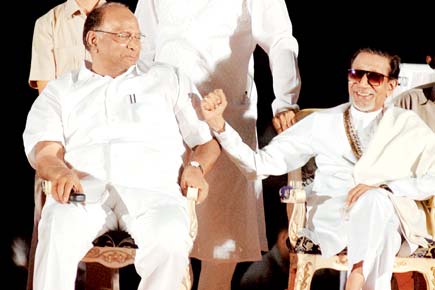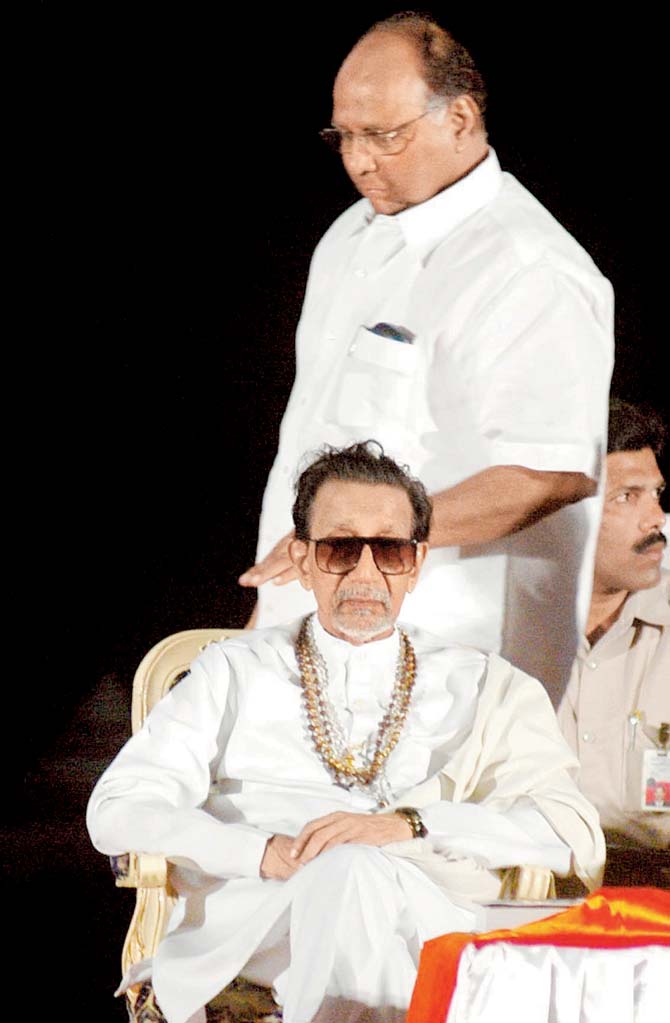Sharad Pawar's book 'On My Terms' is rich in detail about various important events in Independent India’s history. In this extract, he writes about Bal Thackeray, and two of the finest non-Gandhi prime ministers

Sharad Pawar’s On My Terms is rich in detail about various important events in Independent India’s history, including his own meteoric rise through state and national politics. In this extract, he writes about Bal Thackeray, and two of the finest non-Gandhi prime ministers.
ADVERTISEMENT
Balasaheb Thackeray. A good friend and an equally good opponent of mine. Though older than me by about 14 years, his political career started with the inception of the Shiv Sena in 1966, only a year before I got elected to the Maharashtra legislative assembly in the 1967 elections. Since then we crossed swords in the political field right till his death in November 2012.
Read Story: Sharad Pawar celebrates 75th birthday with NCP workers

Sharad Pawar with Bal Thackeray. Pic/mid-day archives
A cartoonist par excellence, he was a fierce orator, a skill which he used to great effect in building his party. He was good at coining funny phrases and nicknames for his political opponents. I was one of his favourite targets. He would often call me ‘maidyaacha pota’ (a sack of flour), to make fun of my heavy girth.
In private meetings, however, Balasaheb was a warm person who stood by his friends through thick and thin. He had a treasure of anecdotes, and he was an excellent raconteur. Few people know that he had good knowledge of medicinal herbs, which he grew in the rear portion of Matoshree, his home in Bandra. I used to visit him there and often saw him recommending herbs from his own garden for someone’s ailment or injury. When I was undergoing treatment for cancer in 2004, Balasaheb sent me a very touching letter. Addressing me as ‘Dear Sharadbabu’, as he always did in private, he went on to list several commandments relating to my dietary and working habits. ‘I hereby direct you to take good care of your health,’ he said.
Also Read: Sonia did not want someone with independent mind as PM: Sharad Pawar
I and my wife Pratibha would often visit Matoshree for gupshup and dinner. Meenatai, Balasaheb’s wife, was a great cook and a gracious host. She would serve us delicacies of Kayastha cuisine (the Kayastha community, to which the Thackerays belong, is well known for its passion for food). Balasaheb and Meenatai would also visit our home at Maheshwari Sadan. On a few occasions they were our guests at Varsha, the chief minister’s official residence, when I was the chief minister.
Once a friend, always a friend was Balasaheb’s credo. Although we often had to cross swords as our political views clashed, it didn’t affect our friendship. Drawing cartoons was Balasaheb’s first love as was evident from the way he ran his weekly Marmik, where he lampooned all and sundry to make a point. After Balasaheb left his job at the Free Press Journal in Mumbai in the 1960s, he, B.K. Desai and I thought of launching a Marathi news weekly which would compare with the best in the world. We held several meetings at his residence to finalise the content, design and marketing plans.
After everything was put in place, the issue of the launch date came up. It was said at the time that one of Balasaheb’s sisters had ‘divine’ powers and that she could predict the future.
Balasaheb called her over for consultation. We put her a question about our soon-to-be-launched magazine. The sister went into a trance and giving us an auspicious date for the launch, she said, ‘The magazine has a bright future. Keep the first copy in the sanctum sanctorum of Siddhivinayak temple at Prabhadevi. You will see that all your copies are sold out in no time. Not a single copy will be in the market.’
She was right. There was no trace of the magazine in the market as there were no takers. Soon, we had to wind up the joint venture.
In September 2006, Supriya was elected for the first time to the Rajya Sabha from Maharashtra. Soon after her candidature was announced by the NCP, Balasaheb called me up to offer his party’s support. ‘Sharadbabu, I have seen her since she was a knee-high girl. This is a big step in her career. My party will make sure that she goes to the Rajya Sabha unopposed.’
I was deeply touched by the gesture. However, the Sena was in alliance with the BJP in Maharashtra. ‘But what about the BJP?’ I asked. Balasaheb’s reply was instant and true to his character. ‘Oh, don’t worry about Kamalabai (‘Kamal’, lotus, being the BJP’s poll symbol). She will do what I say.’
On Narasimha Rao
PV Narasimha Rao is one leader who, in my opinion, deserved much more recognition and respect than he actually received in our country. It is being gradually accepted—somewhat grudgingly, though, in certain circles—that Rao should be given a very large share of the credit for turning around the Indian economy in the 1990s.
Rao became prime minister when the Indian economy was in a precarious condition. Manmohan Singh, the then finance minister, is widely and rightly lauded for presenting a landmark budget that year. But it would not have been possible for Dr Singh to break new ground without the firm political backing of his prime minister.
The reason why Rao’s exceptional contribution to the nation’s progress was not applauded was probably due to the fact that he, well, didn’t belong to the Gandhi family. He came from a modest background.
A man of extraordinary intelligence, Rao was fluent in Telugu, Marathi, Kannada, Bengali, Gujarati, Hindi and English. When I was the defence minister in his government, we used to often converse in Marathi. During that period, I was witness to his deep understanding of international relations.
Although I had contested against him for the prime minister’s post, he didn’t hold it against me. We got along well. Our relationship went back to the days when he was the national general secretary of the Congress and I was secretary of the party’s Maharashtra state unit. He hailed from Andhra Pradesh, but was closely linked to the Marathwada region in Maharashtra.
Read Story: Prez, PM, Sonia hail Sharad Pawar as he turns 75
I was in the Congress (S) when the Congress nominated him to contest a Lok Sabha election from Ramtek in the Vidarbha region of Maharashtra. He won the keen fight, defeating Shankarrao Gedam of our party.
‘I hope I shall never have to fight an election against an opponent like you,’ Rao said later. Subsequently, we were in the same party and he made it a point to take me with him for his election campaigns. He was an astute politician who made all his moves deftly and after deep thought. This was often made fun of. It was joked that in the case of Narasimha Rao, not taking a decision was also a decision. I don’t think that was a correct evaluation of Rao. When he wanted something done fast, his decisions were quick.
On Vajpayee
Atal Bihari Vajpayee could blend politics and poise with effortless ease. Though ideologically there was no common ground between us, I always found him to be a highly cultured person who genuinely believed in democratic values and the parliamentary system.
Atalji was the first leader without any connection with the Congress to head a government at the Centre. I was leader of the opposition at the time. He could run the NDA government for a total of six years because he recognised that Indian polity had undergone a major transformation and the days of one-party government were over. Regional parties were treated with respect and given their due for the first time during his tenure.
His unique working style carried him through despite a number of odds. He had a fine sense of right and wrong. And a delightful sense of humour too. Certain key posts like those of the chief vigilance commissioner or the CBI director are filled after consultations between the prime minister, his senior cabinet colleagues and the leader of the opposition.
Attending those meetings with Atal Bihari Vajpayee, L K Advani and Jaswant Singh was a pleasure because Atalji discarded partisanship and took the decisions purely on merit.
A typical meeting would start with the prime minister sitting with his eyes closed and none of us saying a word for the first few minutes. After a while, Atalji would slowly open his eyes, cast a thoughtful look at those present, and ask, ‘Aaj ki meeting ka prayojan kya hai?’ (What is the agenda for today’s meeting?).
Jaswant Singh would then explain that the meeting was convened to select a candidate for a particular post. Atalji would again look at each of us and ask, ‘Aap ke man mein koi hai?’ (Do you have anyone in mind?). If all of us agreed on a name, the meeting would get over quickly. If we differed, the prime minister allowed us to debate on the merits and demerits of individual candidates for a few minutes and then call for a tea break. On resumption, he would again listen to us for a while and announce his decision.
I remember a meeting when Advaniji and I just could not agree on a particular name. After hearing us out patiently for some time, Atalji intervened in his inimitable style. Turning to Advaniji, he pointed towards me and said, ‘Lalji, hum log satta mein abhi aaye hain. Inko satta ka humse zyada tajurba hai. Inka kehna maan lete hain.’ (Lalji, we have come to power only recently but these people have a long experience of running a government. Let us go by what he says.)
Atalji was much more open and progressive in his outlook compared to his colleagues from the RSS parivaar. No wonder his popularity cut across all party lines and ideological barriers.
Excerpted from On My Terms: From the Grassroots to the Corridors of Power by Sharad Pawar, published by Speaking Tiger, New Delhi, 2015.
 Subscribe today by clicking the link and stay updated with the latest news!" Click here!
Subscribe today by clicking the link and stay updated with the latest news!" Click here!







